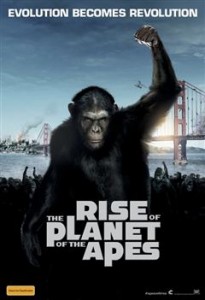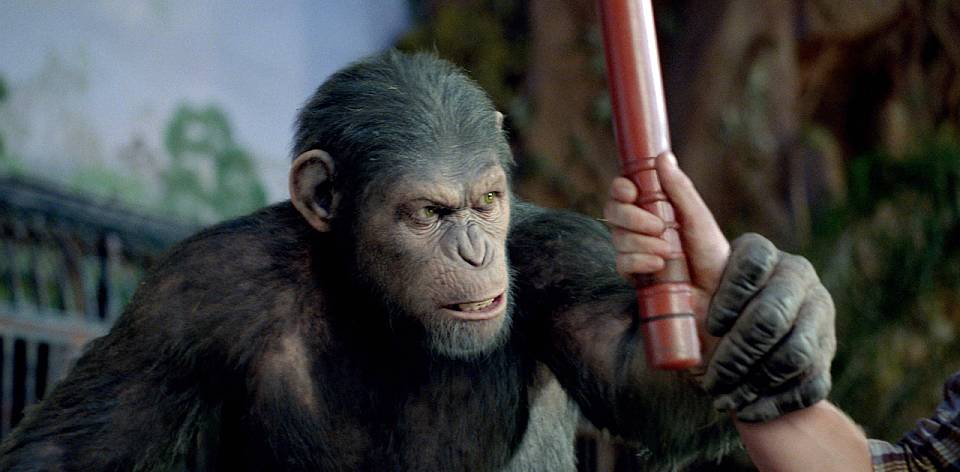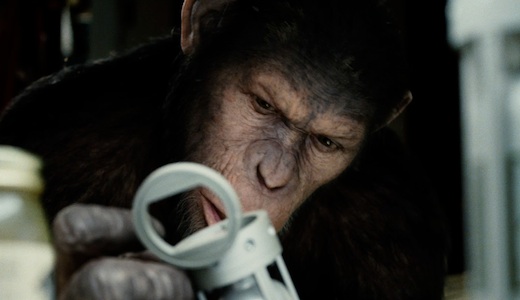 There are few films that have evolved into cultural shorthand quite so well as 1968’s Planet of the Apes. The Charlton Heston vehicle that saw the lead travel through time to a mysterious planet where talking apes ruled over mute and subjugated humans covered everything from civil rights and racism to nuclear politics under the guise of a sci-fi adventure into the twilight zone of role reversal. After all, it was Earth all along. And we blew it up. What followed was a phenomenal set of four sequels, two television series (including both a live action and animated one) and a 2001 remake. With nuclear annihilation less pertinent than it was during the height of the Cold War, a reboot to the franchise was long overdue.
There are few films that have evolved into cultural shorthand quite so well as 1968’s Planet of the Apes. The Charlton Heston vehicle that saw the lead travel through time to a mysterious planet where talking apes ruled over mute and subjugated humans covered everything from civil rights and racism to nuclear politics under the guise of a sci-fi adventure into the twilight zone of role reversal. After all, it was Earth all along. And we blew it up. What followed was a phenomenal set of four sequels, two television series (including both a live action and animated one) and a 2001 remake. With nuclear annihilation less pertinent than it was during the height of the Cold War, a reboot to the franchise was long overdue.
In Rise of the Planet of the Apes, scientist Will Rodman (James Franco, Your Highness) is on the cusp of a cure for Alzheimer’s developed by testing an experimental drug on apes. The results are phenomenal, increasing both the intelligence of the apes and Will’s hopes of finding a cure for his ailing father (John Lithgow, Leap Year). When the experiments go awry, the lab director orders the apes destroyed, and Will finds himself in the care of the baby chimp Caesar (a motion-captured Andy Serkis, Burke & Hare). Quickly realising that Caesar is more intelligent than other apes, Will continues to work in secret. Until, that is, Caesar is ripped away from his human family, and is thrust amongst an abused ape population at an animal shelter.
Following the attempt of a reboot under the direction of Tim Burton, Charlton Heston’s famous refrain of “God damn you all to hell!” may be been apt. While that film undoubtedly had some state of the art make-up effects, and an ending that mirrored the Pierre Boulle source novel, the attempt to outdo the shock ending of the original left a bitter taste in many mouths than no amount of bananas could possibly erase. Although lead ape Casear shares a name with Roddy McDowell’s protagonist of the ape revolution in Conquest of the Planet of the Apes and its sequel, there is little direct connection to that storyline. Rise of the Planet of the Apes returns to the themes of the original film, in that man is the unwitting creator of his own destruction and ultimate subjugation. In a sign of the times, it is drug therapy and cell research (and not the A-Bomb) that is the God-defying tool that brings down mankind by enhancing the intelligence of the apes, showing that while our technologies may have evolved since the 1960s, our fears have not.
Rick Jaffa and Amanda Silver’s screenplay is not only suggested by Boulle’s novel, but as one can probably tell from the plot summary, the Bible and the story of Moses. Like that figure (another played by Charlton Heston, in The Ten Commandments), the orphaned slave child is sent to live among his captors, only to lead his fellow slaves into revolution and, in a spectacular sequence on the Golden Gate Bridge, across the water to the promised land. Yet within this tale is the beating heart of a modern morality fable, with fully fleshed characters who aren’t simply caricatures of the evils of society. Franco’s pained father figure often means well, but finds out the hard way that humans and apes do not think the same way. If the documentary Project Nim was the warning shot, then this film is the punch in the face.
The special effects, from Joe Letteri’s team at the incomparable WETA Digital (The Lord of the Rings Trilogy, Avatar, King Kong) are groundbreaking. Using the latest advancements in motion-capture (or ‘mo-cap’ technology), and veteran mo-cap actor Serkis, Letteri’s team have created movement, believability and more importantly emotion that was never achievable by the 1968 Oscar-winning masks. From the fluid motion of the acrobatic sequences, the casual strides across the room or the meaningful stares from behind the bars of a cage, the work on Caesar in particular is so realistic, you will believe an ape can raise an army of the outraged.
For series fans, there are more than enough hints of things to come should they choose to continue with it. From nice audio and visual call-backs to the original films, to the mandatory “wait through the credits” bit, Rise of the Planet of the Apes has more than simply earned the right to use one of the most famous science-fiction series titles. It is a classic film in its own right, and one of the most intelligent pieces of popcorn fodder to come out of Hollywood in a year filled with strong competition.
[stextbox id=”grey” bgcolor=”F2F2F2″ mleft=”5″ mright=”5″ image=”null”]Rise of the Planet of the Apes is not only an amazing special effects achievement, but a gripping and emotionally engaging blockbuster to boot.[/stextbox]
[stextbox id=”grey” bgcolor=”F2F2F2″ mleft=”5″ mright=”5″ image=”null”]![]() USA | 110 minutes | Director: Rupert Wyatt | Starring: James Franco, Andy Serkis, John Lithgow
USA | 110 minutes | Director: Rupert Wyatt | Starring: James Franco, Andy Serkis, John Lithgow
[/stextbox]
Rise of the Planet of the Apes is released in Australia on 4 August 2011 from Fox.






No Responses